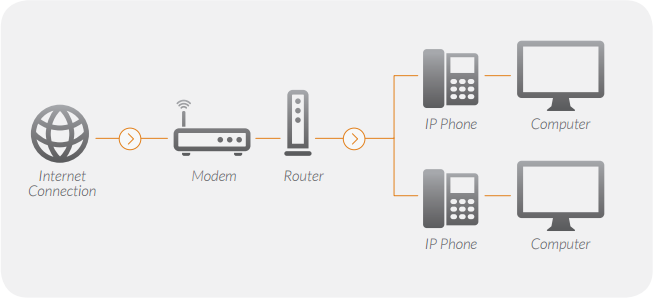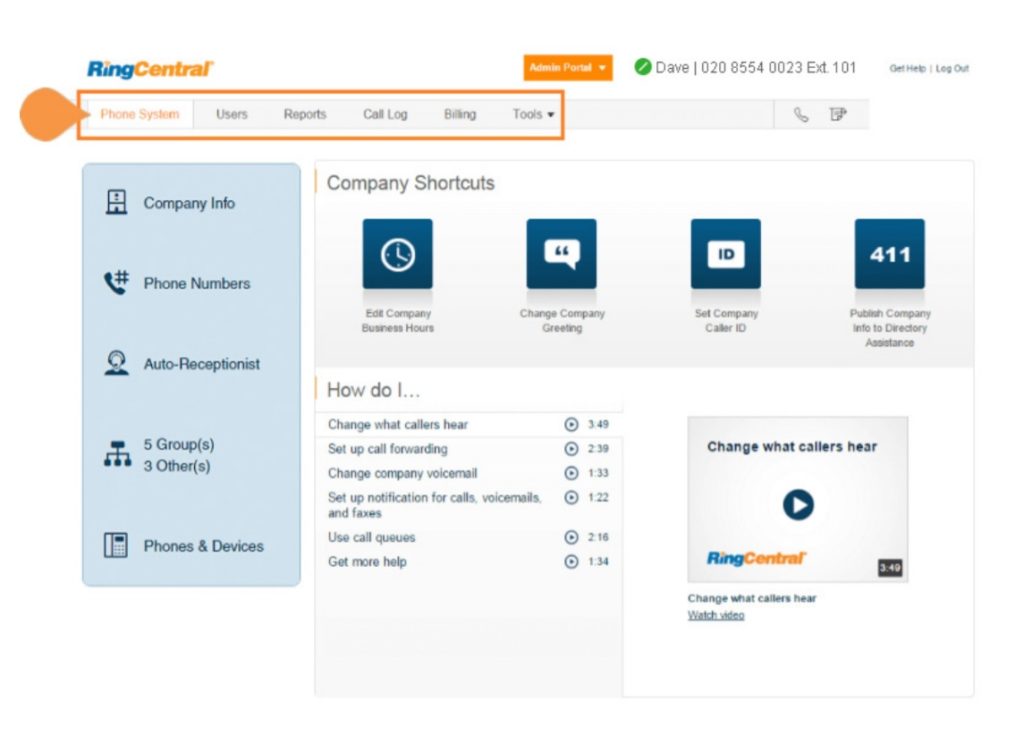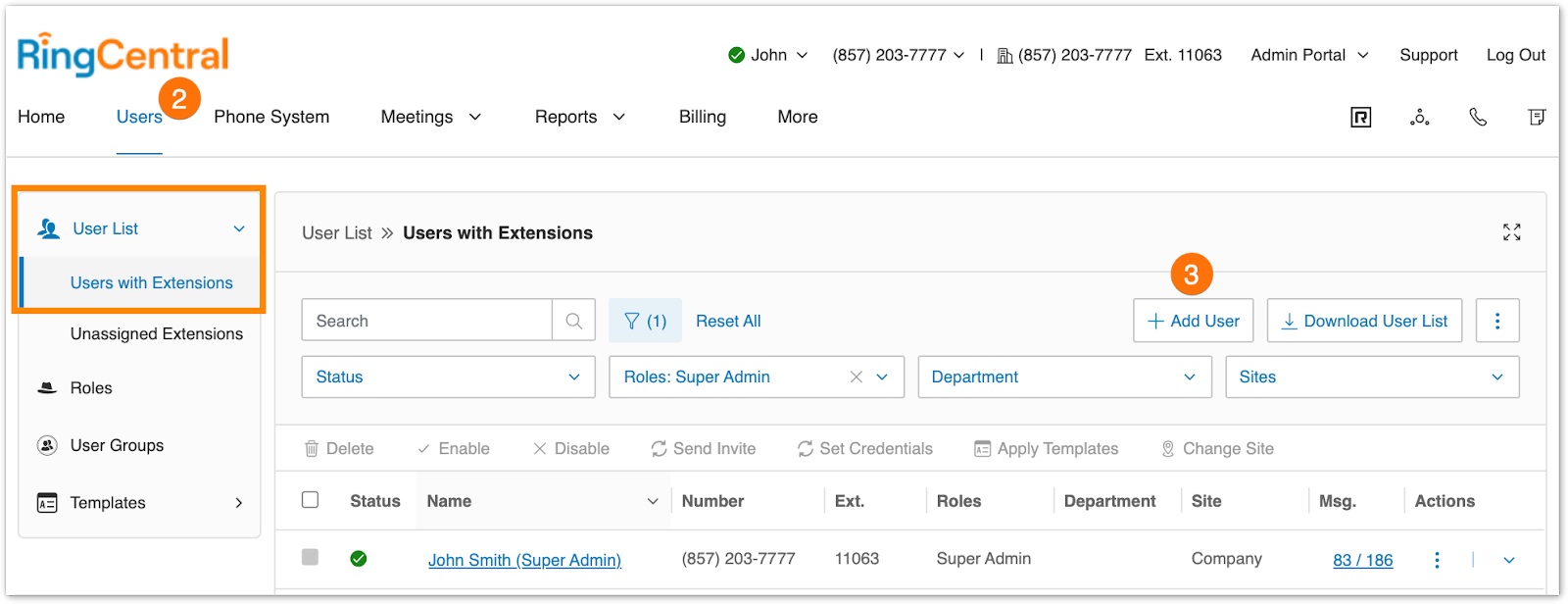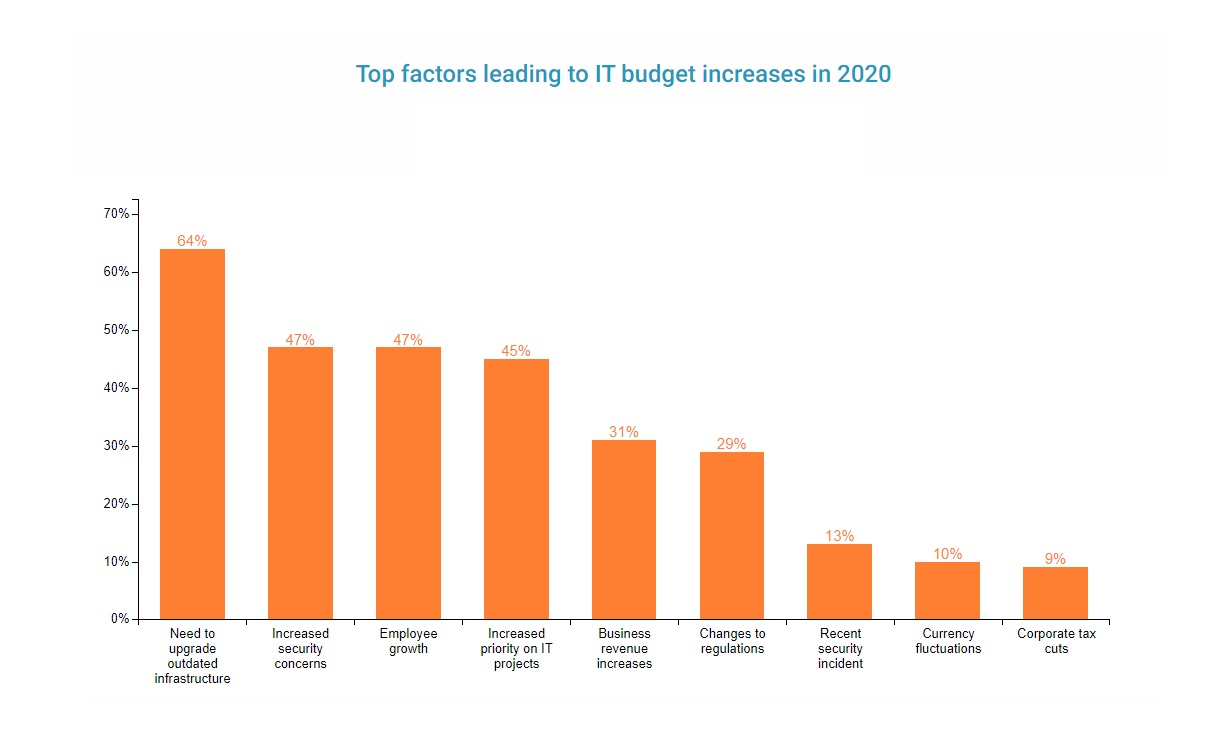Introduction
In recent years, we’ve seen the rapid modernisation of digital communication systems and an increased demand for flexibility in the workplace. As employees embrace the benefits of remote working, businesses are turning to the cloud for agile solutions that maximise productivity and efficiency.
One of the most fundamental places to start is, of course, your business’s phone system.
Cloud-based telephone systems are hardly a new concept – traditional systems have been declining in popularity since 1998. However, many small businesses still haven’t made the switch from traditional to cloud PBX systems, even though the need to upgrade outdated infrastructure was identified as the main factor leading to IT budget increases in 2020.
So, let’s explore why a cloud-based telephone system is superior to an on-premise one and why making the switch is the right move for your business communications strategy and long-term goals.
What is a Traditional PBX?
Traditional PBX (Private Branch Exchange) is a telephony system that handles internal and external business communications. Copper phone lines connect to an on-premise phone server, which then connects to the PBX box within a business site.
Unlike a residential landline, on-premise PBX accommodates multiple users and offers extra features like phone conferencing and faxing. It isn’t, however, capable of any advanced calling or dialling features.
While traditional PBX has been the standard for communication for decades, businesses are quickly moving away from legacy phone systems. Traditional PBX is not only expensive and difficult to maintain but incredibly inflexible to digital communication innovations.
What is a Cloud PBX?
Cloud PBX, also known as virtual PBX or hosted PBX, is a managed, IP-based PBX solution. It eliminates the need for bulky equipment and messy copper phone lines by employing cloud-based software and VoIP (Voice over Internet Protocol) tech to provide telephone connections via the internet.

Rather than host all the necessary hardware on your own premises, the server is located in the cloud and managed by a third-party provider, making it a reliable, enterprise-grade solution.
VoIP technology converts your voice into digital data packets with individual destination addresses. These data packets are sent to your cloud PBX provider over the internet, where the server establishes the quickest route to the desired destination. Once the packets are received, they’re ordered and relayed to the receiver as recognisable speech – all in milliseconds.
With a good internet connection, it’s virtually impossible for callers to distinguish a cloud phone system from an on-premise phone system.
Cloud PBX solutions provide the same business-specific functionalities as on-premise PBX, regardless of whether you’re using a dedicated VoIP handset or a softphone (a simple, device-agnostic software application that you can install to enable VoIP phone calls).
However, hosted PBX systems step it up a notch by providing advanced features like software and mobile app integrations, unified communications features, the ability to modify your caller ID, and more.
Features of Cloud PBX
From video conferencing to advanced call handling, here are some of the most popular and valuable features provided by cloud PBX systems:
- Online Management
Cloud platforms make it easy for managers and employees to have control over their phone systems without needing extensive IT knowledge.
For example, through RingCentral’s Admin Portal, you can manage everything from your business call flow to your call recordings, enabling you to store, categorise, and analyse phone calls for training and compliance purposes effortlessly.
Employees also have the benefit of managing their call forwarding routes and voicemail-to-email settings.

- Ring Groups
Ring groups are a call routing functionality that distributes incoming calls to employees based on their department, geographic location, specialism, etc. It’s a way of organising workflows and ensuring that callers are immediately directed to the right team.
If, for example, you created a ring group for your sales team, every team member would be notified of any incoming calls to that department on their individual IP phones.
- Voicemail to Email
Cloud platforms like RingCentral let you send your voicemails to an email address as a downloadable audio file attachment or transcription. It’s handy for staying on top of your communications and keeping your voicemail account clear while being notified of missed calls.
You can even configure the feature to send specific types of email notifications to different or even multiple recipients.
- Call Queue
Along with typical business phone call features like call transfer, call barring, and call forwarding, some cloud PBX systems also provide call queues.
Call queues direct inbound callers into a virtual queue, placing them on hold until an agent is available to take their call. If you have an influx of calls, call queueing helps to organise, prioritise, and streamline communications using advanced call handling rules and call routing strategies like IVR menus and scenario-based routing.
Call queues are great for shortening hold/wait times and streamlining customer service communications, both of which have a significant impact on the customer experience.
- Video Conferencing
There’s no need to purchase a separate video conferencing platform, as cloud PBX systems come readily equipped with video conferencing and collaboration tools. Specific functionalities and features vary among providers but most generally offer screen sharing, large call capacities, and multi-device compatibility.
- Instant Messaging
Many cloud-based PBX providers also offer unlimited instant messaging. Employees can send and receive SMS and MMS messages via their chosen devices for easy internal and external communication purposes, leveraging features like bulk texting and automated text responses.
- Auto Attendant
An auto attendant is essentially a virtual receptionist and the first point of contact for customers.
RingCentral’s auto attendant feature allows you to answer calls with a customised company greeting before filtering and managing call flows to route the caller to the right agent, department, or extension.
- Extension Dialing
This helps optimise internal communication processes. Instead of having to dial a whole phone number, employees can simply punch in a three-or-four digit extension number to connect to specific individuals or groups.
While you might only consider extension dialling helpful to global corporations or hospitals, even small businesses can benefit from employees not having to memorise multiple different phone numbers.
- Conference Calling
Whether you have 10 or 10,000 employees, the ability to hold high-quality online conference calls is quickly becoming essential in the age of the hybrid workplace. With conference bridging, employees can dial into a virtual meeting room from any device anywhere.
Another notable cloud PBX feature includes call analytics, which allows you to track real-time data and metrics like average wait times, call transfers, missed calls, and more. Not only can this help you manage and optimise internal workflows, but combined with cloud-based platforms’ integration capabilities, you can automatically send this data to your CRM to improve your customer service experience.
What Are The Advantages of Cloud PBX?
While on-site PBX systems are capable of performing tasks like call queuing and call forwarding, it takes dedicated IT personnel to implement and maintain these functionalities. In contrast, a cloud-based PBX comes readily equipped with these features with little to no maintenance on your end.
There are plenty of other advantages too:
Can be Used For Remote Business Phone Calls
Whether your employees are away from their desks, working from home, or on the road, cloud PBX systems ensure that everyone stays connected. Because the connection is made via the internet, all employees need is a device that connects to the internet and a virtual mobile number to make and receive unlimited calls from anywhere.
RingCentral is compatible with mobile phones (both Android and iOS devices), as well as computers and dedicated VoIP handsets, giving remote employees the flexibility to use their preferred hardware.
Regardless of their devices, remote workers have access to the same advanced features as employees who work in the office – they can even attend high-quality video conferences from the other side of the world.
Does Not Require Server Maintenance
An on-premise server can cause major disruptions and downtime if there’s a technical fault, particularly if you don’t have the expenses to hire an around-the-clock technician.
However, with cloud PBX, any maintenance, upgrades, and repairs are fully handled by your VoIP provider. With RingCentral, you’re guaranteed an uptime SLA of 99.999% and comprehensive redundancy.
By building failsafes and ensuring that multiple servers exist as backups in different geographic locations, RingCentral’s cloud services minimise the risk of downtime in the case of a power outage, natural disaster, or any other unforeseen circumstance. However, if you do run into any issues, 24/7 online support is available.
Has Lower Costs
You’re probably aware that making and receiving VoIP calls is much cheaper than using a traditional landline, with cost savings on both local and international calls. However, it’s not only phone calls that can save you money.
Unlike the considerable expense of building, maintaining, and upgrading on-premise PBX phone systems, the upfront and maintenance costs of cloud PBX systems are lowered thanks to the consolidation of communication systems.
Rather than purchasing each part separately, you can adopt a unified communications solution like RingCentral and get everything you need for your business comms in one place.
Most providers also propose flexible pricing plans to suit a range of business needs and sizes, with some even offering free VoIP trials so you can ensure their service is right for you.
Easier Setting Up
Some businesses choose to utilise SIP trunks to enable their existing legacy systems to connect to the internet. However, this method requires a dedicated IT department to manage the implementation (not to mention the hassle of regular maintenance).
Cloud-based PBX providers pride themselves on the fact that even professionals with minimal IT knowledge can set up and maintain their systems.
With very limited hardware required, it’s your provider’s responsibility to handle most of the switchover. Tasks like number porting and configuration can also be completed with the help of your provider to get your system up and running quickly.
From there, you can simply use the online portal to maintain your settings.

What Are The Disadvantages of Cloud PBX?
Cloud telephony systems don’t have many disadvantages, but there are a couple that you should be wary of before making the switch:
High-Speed Internet is Needed
Virtual phone systems rely entirely on the internet. If your internet provider’s service is frequently unreliable or poor, your call quality will suffer. Dropped calls, high latency, and jitter are just some of the problems you might face with a poor internet connection.
Before diving into cloud PBX investment, test your internet speed and perform tests to maximise your call quality.
Must be Vigilant About Security
As with anything that operates over an internet connection, cloud PBX systems are susceptible to security breaches. Traditional PBX, which transfers data via PSTN, is more resistant to hacking attempts.
Luckily, you can significantly reduce the risk of cyberattacks by selecting a trustworthy cloud PBX service provider. RingCentral provides seven layers of security to protect your architecture, data, processes, and workforce and implements updates continuously to keep security solutions as robust as possible.
Work with your provider to ensure the comprehensive implementation of measures like SIP trunk endpoint security, firewalls, toll fraud detection, and suspicious activity monitoring and notifications. It’s also a good idea to utilise a virtual private network (VPN), voice data encryption, and, of course, frequent password updates.
Conclusion
Making the decision to switch from a traditional phone system to cloud PBX is certainly something to consider if you’re trying to reduce business costs and enrich your remote working capabilities. When weighing up the advantages and disadvantages of making the switch, it’s important to frame your decision in the context of your long-term business goals.
RingCentral allows you to leverage multiple communication capabilities to optimise workflows and enhance the customer experience. With the added benefits of being easy to set up and maintain, it’s clear to see why so many businesses are leaving legacy systems behind.
If you’re a business looking for enterprise-grade solutions to maximise scalability, flexibility, cost-effectiveness, and future-proofing, then a cloud PBX system is undoubtedly the right choice for you.
Originally published 07 Dec, 2021






